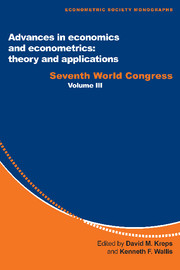Book contents
- Frontmatter
- 1 Causal analysis and statistical inference on possibly non-stationary time series
- 2 Cointegration, long-run comovements, and long-horizon forecasting
- 3 Testing and measurement in competition models
- 4 Empirical equilibrium search models
- 5 Posterior simulators in econometrics
- 6 Restricted least squares subject to monotonicity and concavity constraints
- 7 Bootstrap methods in econometrics: theory and numerical performance
- 8 Econometric models of option pricing errors
- 9 New minimum chi-square methods in empirical
- Index
4 - Empirical equilibrium search models
Published online by Cambridge University Press: 05 January 2013
- Frontmatter
- 1 Causal analysis and statistical inference on possibly non-stationary time series
- 2 Cointegration, long-run comovements, and long-horizon forecasting
- 3 Testing and measurement in competition models
- 4 Empirical equilibrium search models
- 5 Posterior simulators in econometrics
- 6 Restricted least squares subject to monotonicity and concavity constraints
- 7 Bootstrap methods in econometrics: theory and numerical performance
- 8 Econometric models of option pricing errors
- 9 New minimum chi-square methods in empirical
- Index
Summary
INTRODUCTION AND MOTIVATION
The labor market shows more resemblance to a busy street market than to a well-organized auction. As in a street market, there are many distinct buyers and sellers of a similar commodity, and the turnover of these agents prevents that complete knowledge of supply and demand is ever attained. Agents search for good deals, and in doing so they evaluate offers on the basis of their impression of the alternatives in the market. If we observe the actions of the agents in such a market, we may hope to learn which strategies they use. Moreover, trade occurs even between agents who do not have complete knowledge of supply and demand, and our observations may be informative on the determination of the terms of the transactions in such a market.
In labor economics, research on decentralized search markets has been and still is very active. This research is mainly theoretical. Only recently, researchers have used models from the vast theoretical literature in empirical studies. There are a number of reasons for this delay. First, theoretical models need to be adapted to empirical research, and this requires often considerable effort. Second, market models seem to require information on both sides of the market. In the previous decades, labor economists have invested heavily in the collection of data on the suppliers of labor. Efforts to collect comparable data for firms had less success. Without these data the estimation of market models seems to be pointless.
- Type
- Chapter
- Information
- Advances in Economics and Econometrics: Theory and ApplicationsSeventh World Congress, pp. 82 - 127Publisher: Cambridge University PressPrint publication year: 1997
- 7
- Cited by

